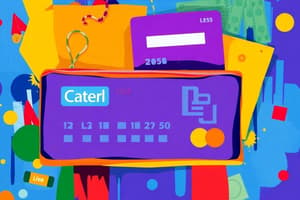Podcast
Questions and Answers
What is a significant disadvantage of using cash as a payment method?
What is a significant disadvantage of using cash as a payment method?
- It's easy to trace
- Cash can be counterfeit (correct)
- No technology is required
- It is accepted everywhere
Which of the following is an advantage of debit cards over cash?
Which of the following is an advantage of debit cards over cash?
- They provide traceable transactions (correct)
- They can be used for borrowing
- They are always accepted by retailers
- They require no bank involvement
What is a common risk associated with credit cards?
What is a common risk associated with credit cards?
- They can only be used for small purchases
- Overspending can lead to debt (correct)
- Interest rates can be low
- No written orders are required
What is one reason why cheques are considered 'old-fashioned'?
What is one reason why cheques are considered 'old-fashioned'?
Which payment method allows for automatic monthly withdrawals for bills?
Which payment method allows for automatic monthly withdrawals for bills?
What is a potential disadvantage of electronic transfers?
What is a potential disadvantage of electronic transfers?
What makes debit cards more secure than cash?
What makes debit cards more secure than cash?
Why might someone prefer using cash over credit cards?
Why might someone prefer using cash over credit cards?
What is a key characteristic of a Standing Order?
What is a key characteristic of a Standing Order?
What is a primary risk associated with Direct Debits?
What is a primary risk associated with Direct Debits?
Which statement about Pre-Paid Credit Cards is true?
Which statement about Pre-Paid Credit Cards is true?
What is a benefit of using Mobile Banking?
What is a benefit of using Mobile Banking?
What is a disadvantage of using Store Cards?
What is a disadvantage of using Store Cards?
Which of the following describes Charge Cards?
Which of the following describes Charge Cards?
What is a feature of Contactless payments?
What is a feature of Contactless payments?
What should an account holder do to avoid being overdrawn?
What should an account holder do to avoid being overdrawn?
Flashcards
Cash
Cash
Physical money (notes and coins) used for transactions.
Debit Card
Debit Card
A card linked to a bank account used for purchases or withdrawals.
Credit Card
Credit Card
A card that allows borrowing money for purchases, repaid later.
Cheque
Cheque
Signup and view all the flashcards
Electronic Transfer
Electronic Transfer
Signup and view all the flashcards
Direct Debit
Direct Debit
Signup and view all the flashcards
Payment Methods
Payment Methods
Signup and view all the flashcards
Payment Method Advantages/Disadvantages
Payment Method Advantages/Disadvantages
Signup and view all the flashcards
Standing Order
Standing Order
Signup and view all the flashcards
Pre-paid Credit Card
Pre-paid Credit Card
Signup and view all the flashcards
Contactless Payment
Contactless Payment
Signup and view all the flashcards
Charge Card
Charge Card
Signup and view all the flashcards
Store Card
Store Card
Signup and view all the flashcards
Mobile Banking
Mobile Banking
Signup and view all the flashcards
Overdraft
Overdraft
Signup and view all the flashcards
Study Notes
Level 3 Business Unit 3: Personal and Business Finance
- Lesson Objectives: Define different payment methods, analyse their uses, and evaluate their advantages and disadvantages.
Cash
- Comes in various denominations (notes and coins).
- Accepted everywhere, reliable.
- Easy for budgeting, no technology needed.
- Can be lost, stolen, or counterfeited.
- Not suitable for all purchases.
- Hard to trace.
Debit Cards
- Issued by banks for purchases and cash withdrawals.
- More secure and traceable than cash.
- Protects purchases.
- Online transactions use them.
- Some retailers may not accept them.
- Delays in appearing in transaction history can lead to overspending.
- Open to fraud.
Credit Cards
- A way to borrow money from a lender (e.g., bank).
- Allows for more time to pay.
- Can be used for large purchases.
- Can encourage overspending and debt.
- Leads to poor credit scores, credit limits, and high-interest rates.
Cheque
- A written order to a bank to transfer money between accounts.
- Secure as only the named person can cash it.
- Exact amounts prevent change issues.
- Old-fashioned – few retailers accept them.
- Processing takes a long time.
Electronic Transfer
- Transfers money directly between accounts.
- Almost instantaneous.
- Records payments.
- No processing fees.
- Convenient for one-off transactions.
- Requires correct setup to avoid loss.
- Not a payment method in retail outlets.
Direct Debit
- Agreement between a bank and a third party (e.g., utilities).
- Funds withdrawn on a set day.
- Easy for regular payments.
- Can be difficult to budget if amounts fluctuate.
- Payee must claim back overpayments.
- Account holder must have sufficient funds to avoid overdrawing.
Direct Debit Guarantee
- Ensures payments, refunds, and cancellation procedures.
- A process for disputes if there's an error.
Standing Orders
- Set amount paid monthly to a third party (e.g., landlord).
- Easy for budgeting as the amount doesn't change.
- Can be easily set up or cancelled.
- Payments are taken regardless of funds available, leading to potential overdraws.
Pre-Paid Credit Cards
- Loaded with a set amount for online spending.
- Secure and prevent overspending.
- Can lose the loaded money if the card is lost or stolen.
- Additional charges may be applied.
Contactless
- Quickly pay for items under a specified amount (e.g., £100) using a bank card/phone without a PIN.
- Fast and instant.
- PIN needed occasionally for security.
- Risk if the card is stolen.
- Transactions may not clear instantly.
Charge Cards
- Allow payment delays for goods and services.
- Balance must be paid when a statement is issued.
- Can have benefits like perks—but may come with an annual fee.
- Risk of debt reduced.
Store Cards
- Offered by individual businesses.
- Used only for purchases at that business.
- Customers can spread costs and may get discounts.
- Usually have high-interest rates.
Mobile Banking
- 22 million UK citizens use mobile apps for banking.
- Quick, convenient, 24/7, multi-layered security.
- Increased sophistication from major banks.
- Lead to close of high-street branches, affecting vulnerable customers.
Task: Mini Debate
- Debate the statement: "Our society is too dependent on technology, we need to bring back traditional banks."
BACS/FPS (Faster Payments Service)
- Method for businesses to pay wages.
- Payments cleared within 2 hours.
- No fees.
- Can be done online, in a branch, or over the phone.
- Not all banks offer it; some take 3 days to clear and have limits.
CHAPS (Clearing House Automated Payment Service)
- Transfers money between accounts on the same day (if requested early enough).
- No transfer limit.
- Fixed charge applied, regardless of the amount.
Studying That Suits You
Use AI to generate personalized quizzes and flashcards to suit your learning preferences.




